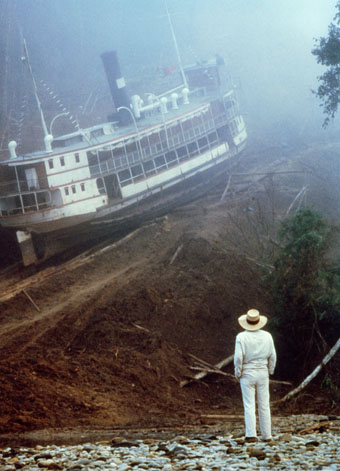Via Revolver comes news that the Volksbühne in Berlin is launching a new series of what basically amounts to unclassifiable works with Eroberung des Nutzlosen. Zwei Abende von und mit Werner Herzog. The first part of that title translates as Conquest of the Useless, which, of course, is also the first part of the title of one of Herzog’s books, subtitled “Reflections from the Making of Fitzcarraldo.” Whether or not Herzog will be reading from that book on Friday and Saturday is hard to say, but he does promise that what he’ll be delivering are not reports from the set, nor exactly are they diary entries. “They’re something different, more like inner landscapes, borne of the delirium of the jungle. But I’m not even sure of that, either.” Accompanied by a cellist, a pianist and a Senegalese singer, “both evenings,” the Volksbühne tells us, “are improvisational. Like jazz. The same material will be presented—interpreted differently each evening.”
In other news. Leos Carax’s Holy Motors has won best film and director at the 45th Sitges Film Festival.
Reading. “A dazzling heist film that can’t help but come off as duly influenced by Steven Soderbergh’s Ocean’s trilogy, South Korea’s number one box-office champ of all time is never less than clever,” writes Steve Macfarlane in Slant. Dong-hoon Choi’s The Thieves is currently in about ten theaters around the country.
In The Big Screen: The Story of the Movies and What They Did to Us, “probably the best overview of the cinema ever written,” according to John Banville in the Guardian (!), David Thomson “again and again presses his case that the attraction of movies is that they play with and on our dreams and deepest yearnings. People go to the cinema, he writes, to sit in the dark ‘beholding an orgy of their own desires burning on the screen,’ yet, paradoxically, the net effect can be a deadening of the spirit.”
“The argument whereby a writer positions himself as a plucky standalone David against the Goliath of po-faced film culture is roughly as valid as Bill O’Reilly’s War on Christmas,” argues Nick Pinkerton at Sundance NOW.
DVD/Blu-ray. “In many ways, Robert Aldrich was an independent filmmaker before the notion existed,” writes Dennis Lim in the Los Angeles Times. “It is one measure of his versatility that he excelled at both women’s melodramas and macho testosterone-fests. The two Aldrich films coming to DVD are prime examples of each category. Just out in a 50th-anniversary edition from Warner Home Video, What Ever Happened to Baby Jane? (1962) remains a classic of camp cinema, a key entry in the once-popular genre of grande-dame Grand Guignol. Less heralded—and perhaps one of the most underappreciated works of Aldrich’s career—Twilight’s Last Gleaming (1977), which Olive Films is releasing next month, is a nail-biting conspiracy thriller with an excoriating take on American foreign policy and the reason wars are waged.”
Los Angeles. Universal Horror B-Sides are screening all month long at Cinefamily.
Obits. In the New York Times, Andrew Roth remembers Eduard Volodarsky, “a Russian screenwriter whose films are recognized classics today in Russia but whose efforts to present a picture of war on his own terms led the Soviet authorities to shelve many of his works for years.” He died on Tuesday, aged 71. Aleksey German’s Trial of the Road, “in which a young Russian partisan who previously collaborated with the Germans must now prove his loyalty to a group of Soviet soldiers by hijacking a Nazi train, brought up troubling questions of turncoat partisans and the rough welcome that many Soviet P.O.W.’s returned to after the war. Filmed in 1971, it was not released until 1986, during the reformist years of perestroika.” And German’s My Friend Ivan Lapshin, “an unheroic portrayal of a local police officer set in a dingy prewar village, painted Soviet idealism in ironic tones. The film, shot in the early 1980s, also gathered dust until perestroika.”
“Szeto Kam Yuen, one of Hong Kong’s top screenwriters, has passed away,” reports Hugo Ozman at Twitch. He was only 48. “He collaborated regularly with Johnnie To and provided the screenplays for many Milkyway Image productions, including Too Many Ways To Be No. 1, The Longest Nite, Expect The Unexpected, A Hero Never Dies, Exiled, Accident and Motorway.” He also “worked with director Cheang Po Soi on Dog Bite Dog and Shamo. He was also the screenwriter for two of Donnie Yen’s most popular films, Sha Po Lang and Flash Point.”
Viewing. Atop a new “terribly hard-boiled list of links to online scholarly studies of Raymond Chandler’s work and its screen adaptations,” Catherine Grant posts “a two-part video of an excellent, illustrated lecture by Adrian Wootton on the screen adaptations of Chandler’s work, including ones the writer scripted himself.”
More browsing? See Mike Everleth‘s “Underground Film Links” for the week and the latest roundup from the Film Doctor.
For news and tips throughout the day every day, follow @KeyframeDaily on Twitter and/or the RSS feed. Get Keyframe Daily in your inbox by signing in at fandor.com/daily.




